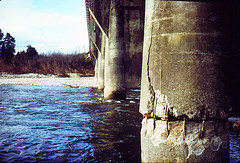 Image by PhillipC via Flickr
Image by PhillipC via FlickrSo the following question naturally arises: what is your exposure to an earthquake? Research indicates that residents in California, Oregon, and Washington are most at-risk. However, parts of Arkansas, Illinois, Indiana, Kentucky, Mississippi, Missouri, and Tennessee are also quite exposed to earthquakes. The New Madrid Seismic Zone runs under these states and, though it occurred long ago, gave rise to one of the largest magnitude earthquakes to ever hit the United States.
If you live in any of these states, you should ascertain your proximity to an earthquake fault zone. California residents can determine their exposure by visiting the State of California's Department of Conservation Web site, which provides a list of affected cities and counties. For other state-specific information, visit the U.S. Geological Survey Web site.
Most homeowners policies specifically exclude earthquake losses, just as they do flood losses. Therefore, if you live near an earthquake seismic zone, consider purchasing a separate earthquake policy or an earthquake endorsement attached to your homeowners policy. In addition, the following are some steps to take that will reduce your chances of injury or property damage resulting from an earthquake.
- Verify that operational fire extinguishers are strategically located on each floor of your home.
- Anchor tall furniture, refrigerators, water heaters, and bookcases securely to the walls.
- Utilize flexible connectors for gas supply to gas-fueled appliances.
- Keep beds away from glass or any hanging object that might fall.
- Verify that your home's roof and chimney are well-maintained, with proper support.
- Apply safety film to windows and glass doors.
- Add anchor bolts or steel plates between the home and its foundation.
- For older homes, work with a civil engineer or city building department to verify that your home is up to code for the earthquake peril.
- Communicate to family members an emergency meeting place should your family get separated during an earthquake.
If you are in your home when an earthquake occurs, stay inside and move away from windows, skylights, doors, and objects that might fall. Crawl under a sturdy item such as a large table or desk. Stay where you are until the shaking stops.

![Reblog this post [with Zemanta]](http://img.zemanta.com/reblog_e.png?x-id=2a7237d7-7fa4-455d-a398-1a70a856e479)
No comments:
Post a Comment